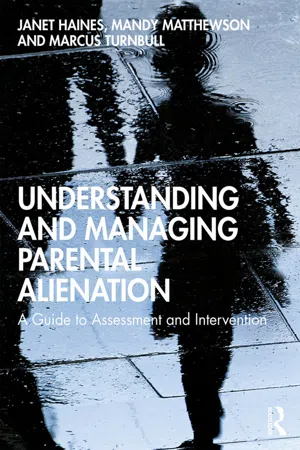
Understanding and Managing Parental Alienation
A Guide to Assessment and Intervention
- 360 pages
- English
- ePUB (mobile friendly)
- Available on iOS & Android
Understanding and Managing Parental Alienation
A Guide to Assessment and Intervention
About This Book
In Understanding and Managing Parental Alienation: A Guide to Assessment and Intervention, Janet Haines, Mandy Matthewson and Marcus Turnbull offer a comprehensive analysis of contemporary understanding of parental alienation. Grounded in recent scientific advances, this is the first book of its kind providing resources on how to identify parental alienation and a guide to evidence-based intervention.
Parental alienation is a process in which one parent manipulates their child to negatively perceive and reject the other parent. Recognising this phenomenon and knowing when to intervene is often the biggest challenge faced by practitioners and this book provides a guide to this process. Divided into six parts, it examines what parental alienation is and how it is caused, how it affects each family member as a mental health concern and form of violence, and how to assess, identify and intervene successfully from a legal and therapy standpoint. Taking on a gender-neutral approach, the book is filled with contemporary case examples from male and female perspectives, cutting-edge research, practitioner-client dialogues, and practitioners' reflections to show the difficult realities of parental alienation.
Practical and accessible, this is an essential resource for mental health professionals working with families experiencing parental alienation, as well as postgraduate students of clinical psychology, counselling, family therapy, social work, and child and family psychology. This book will also be of immense interest to family lawyers and mediators due to its multidisciplinary approach.
Frequently asked questions
Information
Chapter One
What is parental alienation?
Introduction
Parental alienation
Parents’ behaviour affects children’s wellbeing
Children’s rejection of a parent
Table of contents
- Cover
- Half Title
- Title Page
- Copyright Page
- Dedication
- Contents
- List of tables
- Preface
- Part One The nature of parental alienation
- Part Two The alienated family
- Part Three Assessment of parental alienation
- Part Four The alienated family: A legal perspective
- Part Five Intervention with alienated families
- Part Six Identifying parental alienation
- Index